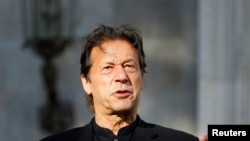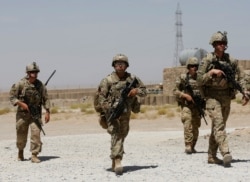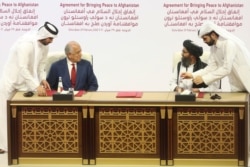Pakistan’s Prime Minister Imran Khan commended U.S. President Joe Biden Wednesday for pressing ahead with efforts aimed at finding a political settlement to almost two decades of war in Afghanistan.
Khan told an officially sponsored conference in Islamabad, which is debating national security issues, that Pakistan has “done all that we could” to promote the U.S.-led Afghan peace process.
“After a long time, there is a hope for peace in Afghanistan, and this opportunity has come after a very long time,” the prime minister said.
“The Biden administration has also recognized that the [Afghan] conflict has continued for 20 years and it must not prolong further,” Khan said.
The United States faces a May 1 deadline to withdraw its remaining troops from Afghanistan in line with a February 2020 deal with the Taliban insurgency reached under former President Donald Trump.
US peace plan
Biden said Wednesday it will be “tough” for the U.S. to withdraw troops from Afghanistan by May 1, but if the deadline is extended, he said it would not be by “a lot longer.”
"That was not a very solidly negotiated deal that the president, the former president worked out," Biden told ABC in an interview that aired Wednesday. "We´re in consultation with our allies as well as the government, and that decision is in process now,” he added.
The Biden administration this month shared a proposed peace plan with Afghan President Ashraf Ghani’s government and the Taliban to try to accelerate a political settlement between the Afghan warring parties.
The proposal, if it wins approval of all sides, would replace the Ghani administration with a so-called transitional government, where the Taliban would also have representation.
The interim setup would then oversee negotiations on a nationwide cease-fire and the future permanent system of governance in Afghanistan.
The presidential and parliamentary elections would be held after the adoption of a new Afghan constitution, as stipulated in the proposed U.S. plan.
Khan reiterated Wednesday that Pakistan’s security and economic progress were directly linked to peace in Afghanistan. He cautioned that Afghan peace and political reconciliation efforts, however, are fraught with “many challenges.”
“No one should underestimate how difficult it is. In a country facing civil war-type situation for 20 years, rivalries and mistrust grow to an extent where it becomes difficult to overcome them,” Khan said.
Washington credits Islamabad with bringing Afghan Taliban leaders to the table for talks with the U.S. that produced the historic February 2020 deal to set the stage for closing what has been the longest war in American history.
Pakistan has traditionally maintained close contacts with the Taliban since the late 1990s when the Islamist group was in control of most of Afghanistan.
The U.S.-led foreign military coalition ousted the Taliban from power, days after the September 11, 2001, terror attacks on American cities plotted by al-Qaida leaders at their sanctuaries on Afghan soil.
Pakistan rejects charges they have covertly provided support to the Taliban’s insurgent campaign in Afghanistan against the U.S. invasion.
Moscow meeting
Meanwhile, representatives of the Afghan adversaries also are set to attend a multi-nation conference Thursday in Moscow about how to cooperate on finding a solution to the conflict.
Russia has invited the U.S. special envoy for Afghan peace, Zalmay Khalilzad, and representatives from countries such as Pakistan and China to the Moscow meeting.
The conference will “complement all other international efforts to support the Afghanistan peace process and also reflects the international community’s concerns about progress to date,” State Department deputy spokeswoman Jalina Porter told reporters Monday in Washington.






